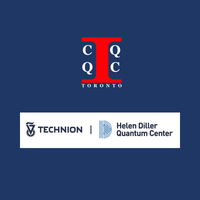In January this year, faculty and students from the University of Toronto (UofT) and the Technion-Israel Institute of Technology came together for a two-day research workshop organized by the CQIQC and the Hellen Diller Quantum Center. This event focused on exploring shared interests in the field of quantum science covering a wide range of theoretical and experimental topics including photonics, condensed matter physics, precision measurements, quantum dynamics, spintronics, quantum optics, quantum computing, and quantum simulations.
The virtual workshop featured twenty presentations that facilitated a successful exchange of ideas and fostered discussions on potential collaborative research topics. One of the most significant outcomes of the workshop was a call for proposals for collaborative research addressing challenges in quantum science and technology. Six bi-institutional teams submitted projects to an evaluation committee consisting of representatives from the UofT and the Technion, which reviewed the proposals and, after a tight deliberation, selected six teams for funding.
Ulrich Fekl, Associate Professor in the Department of Chemical & Physical Sciences at the UofT campus in Mississauga, partnered with Professor Aharon Blank from the Technion to advance a project titled "Diamond-like qubits from molecules." Professor Fekl shared the excitement of his team on the possible outcomes of the project funded by this initiative: “The grant supports one graduate student and we just got started preparing the first samples of our materials. We are synthesizing, at the University of Toronto, novel diamond-related materials that are tunable, modular and flexible, and we are creating them in such a way that they can bear spins. The spins in colour centers of diamond are very promising for quantum computers, but diamond is a material that is very difficult to work with. We are confident that our collaboration will allow us to make materials that will have similar properties but are easier to make, to fine-tune, and to use. The measurements at the Technion will guide the synthesis process in an essential way.”
John Sipe, Professor of Physics at the University of Toronto and CQIQC member, teamed up with Professors Pavel Sidorenko, Michael Krüger, Oren Cohen, and Ido Kaminer from the Technion to work on "Extremely Nonlinear Quantum Optics with Spatially Multimode Drivers.” Professor Sipe explained that their research will “involve light that is intense, multimode, and requires a full quantum mechanical description. Our goal is to understand how such intense, nonclassical light interacts with matter, and to see what new states of light could be generated that might be important for quantum information processing.” He noted that this work, which will encompass both experimental and theoretical aspects, will significantly benefit from the collaboration between the two institutions.
These projects, along with the other successful proposals, including “Chiral Interaction Resonances,” by Professor Yoav Sagi (Technion) and Professor Joseph Thywissen (Department of Physics-U of T and CQIQC member) promise to advance foundational aspects and applications of quantum science and technology by leveraging the strengths and expertise of faculty and students at the CQIQC at the University of Toronto and the Hellen Diller Quantum Center at the Technion – Israel Institute of Technology.


